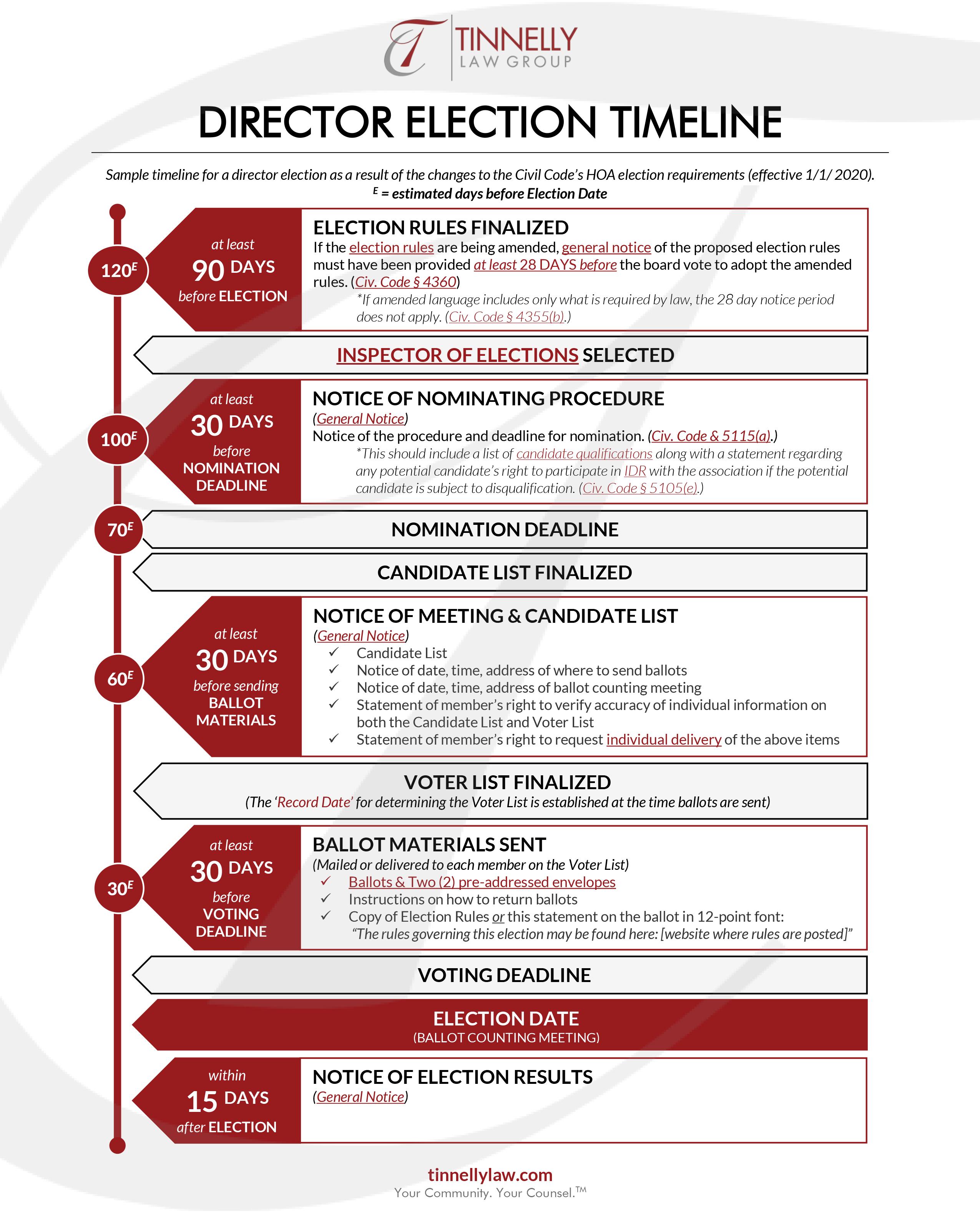
7 minute read
The New State of HOA Election Laws By Steven J. Tinnelly, Esq.
The New State of HOA Election Laws
THE IMPACT OF SB 323 ON ASSOCIATION ELECTION REQUIREMENTS EFFECTIVE JANUARY 1, 2020
By Steven J. Tinnelly, Esq.
INTRODUCTION
Senate Bill 323 (“SB 323”) was recently signed into law. SB 323 makes several substantive modifications to the Civil Code’s provisions governing association elections, effective January 1, 2020. Some of the more significant modifications require associations to amend their election rules to conform to new statutory requirements, limit the types of candidate qualifications an association may adopt, address the only circumstance for elections by acclamation, place limitations on who may serve as an inspector of elections, and bolster the ability of members to overturn an election that is not conducted in accordance with proper procedures.
NEW ELECTION RULE REQUIREMENTS
Various amendments have been made to Civil Code § 5105 regarding the required content of an association’s election rules. The information below summarizes the more significant amendments and their impacts.
No Changes to Election Rules within 90 Days of an Election
Any changes to an association's election rules may not be made less than ninety (90) days prior to an election. Civ. Code § 5105(h). Associations with elections in the first quarter of 2020 should have their legal counsel immediately amend their election rules to comply with the new requirements of SB 323. Any amendments to the election rules beyond that which is specifically required by the new law will require use of the rule change procedure specified in Civil Code § 4360 (e.g., general notice of the proposed amendments to the election rules will need to be provided at least 28 days prior to the board’s vote to adopt the amended election rules).

Voting Rights May Not Be Suspended
An association's election rules must now "prohibit the denial of a ballot to a member for any reason other than not being a member at the time when ballots are distributed.” Civ. Code § 5105(g)(1). This means that an association may no longer suspend any member’s voting rights. Any member is entitled to vote, regardless of whether that member is delinquent in the payment of assessments or is in violation of the governing documents.
Retained “Association Election Materials”
The election rules must be amended to require retention of additional election materials, including both a candidate registration list and a voter list. Civ. Code § 5105(a) (7). The voter list must include the name, voting power, and either the physical address of the voter’s home, the parcel number, or both. The mailing address must also be listed on the voter list if different from the physical address within the association or if only the parcel number is used. The association is required to permit members to verify the accuracy of their individual information on both the candidate list and voter list at least thirty (30) days before the ballots are distributed, and any reported errors must be corrected within two (2) business days by the inspector of elections.
CANDIDATE QUALIFICATIONS
SB 323 limits the scope of candidate qualifications that an association may adopt. The information below discusses each of the four (4) candidate qualifications that an association may adopt through its bylaws or election rules, as well as the mandatory candidate qualification that an association must adopt.
Current in the Payment of Assessments
An association may require a nominee for a board seat to be current in the payment of regular and special assessments. However, a nominee’s failure to pay fines, late charges, interest, and collection fees and costs may not be used as a basis for disqualification, nor may a nominee be disqualified if he or she has entered into a payment plan with the association or if he or she has not been provided an opportunity to participate in internal dispute resolution (IDR) with the association. Civ. Code § 5105(c)-(d). If not being current in the payment of assessments is adopted as a candidate qualification, the association is legally required to impose that same requirement on directors. Civ. Code § 5105(c)(1). Director qualifications must be contained either in the association’s articles of incorporation or bylaws to be enforceable (e.g., for a failure to meet the qualification to be used as a basis for the remaining board members to declare the unqualified director’s seat vacant). Corp. Code § 7221(b). Accordingly, if an association chooses to require candidates for the board to be current in the payment of assessments, the association’s bylaws will need to have the same requirement for directors. Those associations that do not already have such a requirement in their bylaws will need to amend their bylaws in order to establish the necessary director qualification.
No Joint Ownership Interest
An association may disqualify a person from nomination as a candidate if the person, if elected, would be serving on the board at the same time as another person who holds a joint ownership interest in the same lot or unit and the other person is either properly nominated for the current election or is an incumbent director. Civ. Code § 5105(c) (2).
Member for at Least One (1) Year
An association may disqualify a nominee if that person has been a member of the association for less than one (1) year. Civ. Code § 5105(c)(3).
Past Criminal Convictions
An association may disqualify a nominee if that person discloses, or if the association is aware or becomes aware of, a past criminal conviction that would, if the person was elected, either prevent the association from purchasing the fidelity bond coverage required by Civil Code § 5806 or terminate the association’s existing fidelity bond coverage. Unfortunately, HOA insurance carriers have provided very little guidance on what types of criminal convictions would threaten coverage, as most policies use the broad term “dishonest acts” as a basis for policy cancellation.
Mandatory Qualification: Members Only
Civil Code § 5105(b) now requires an association to disqualify a person from a nomination as a candidate if the person is not a member of the association (not an owner of a lot or unit) at the time of nomination. This means that nonowners are no longer permitted to serve on the board, regardless of any contrary provisions contained in the association’s CC&Rs or Bylaws.
IDR Before Disqualification
Regardless of the basis for disqualifying a person from nomination, an association may not disqualify the person “if the person has not been provided an opportunity to engage in [IDR]” with the association. Civ. Code § 5105(e).
ELECTIONS BY ACCLAMATION
Although there is disagreement in the legal community, our firm has always taken the position that the law does not permit uncontested elections to be carried out by acclamation (e.g., the association must still send out ballots and conduct an election even if the election is uncontested). Our position is based on the language of Civil Code § 5100 that requires the use of secret ballots for director elections “notwithstanding any other law or provision of the governing documents.” Accordingly, any bylaw provisions purporting to permit elections by acclamation are superseded by the foregoing language of the Civil Code.
SB 323 has amended Section 5100 to further address this issue. Section 5100 now allows for elections by acclamation, but only for associations that have 6,000 or more units. Civ. Code § 5100(g). This is a clear indication of the Legislature’s intent to have associations smaller than 6,000 units conduct elections and send out ballots even if the election is uncontested.
Above is a ‘Director Election Timeline’ that illustrates the pre-election notice requirements and their timing within the election process. The Timeline is also available for download at: tinnellylaw.com/electiontimeline.pdf
INSPECTORS OF ELECTIONS
Some associations previously opted to have their managing agent or management company serve as inspector of elections, based upon prior language in the Civil Code allowing for such an arrangement to be authorized under the election rules. Civil Code § 5110(b) now prohibits any person, business entity, or subdivision of a business entity from serving as inspector of elections if that person, business entity, or subdivision of a business entity is “under contract to the association for any compensable service other than serving as inspector of elections.”
While the managing agent or management company may be authorized to prepare and send balloting materials, the actual inspector of elections will either need to be a volunteer association member or a third-party inspector of election company. Attention will need to be paid in working with the inspector to ensure that any role to be played by management in connection with the election process is limited to only that which is allowed under the new state of the law.

ENFORCEMENT OF ELECTION REQUIREMENTS
Civil Code § 5145 has been amended to bolster a member’s ability to overturn an election that was not conducted in accordance with all required procedures. If a member files an election challenge and establishes that the election procedures were not followed, the court is now required to invalidate the results of the election unless the association establishes, by a preponderance of the evidence, that the association’s noncompliance did not affect the election results. Additionally, a member who files a successful election challenge in small claims court is now entitled to recover his or her “court costs and reasonable attorney’s fees incurred for consulting an attorney” in connection with the election challenge. Civ. Code § 5145(b).
PRE-ELECTION NOTICES
New pre-election notice requirements effectively require an association to start its election planning approximately four (4) months prior to the election date. These notice requirements pertain to notice of nominating procedures, notice of the candidate list, and various other statements that must be provided to the membership before ballots are sent.
SUMMARY & RECOMMENDATIONS
The proponents of SB 323 assert that incumbent boards have undermined the democratic function of associations by, among other things, improperly disqualifying members from running for the board and limiting members’ voting rights. SB 323 is intended to provide a ‘fix’ to these and other problems by removing much of the discretion associations previously had to develop voting rules and procedures. Regardless of whether the ‘fix’ was needed, some of the statutory changes are helpful in emphasizing the significance of association elections and the important role they play in the continued success of the community.
Associations that have not already begun the process of amending their election rules to accommodate the changes imposed by SB 323 should seek immediate assistance from their legal counsel.

Steven J. Tinnelly, Esq. is the Managing Partner of Tinnelly Law Group. Mr. Tinnelly is very active within the community association industry and devotes a substantial amount of time to educating homeowners and industry professionals about the legal issues affecting California community associations. He currently serves as President-Elect for the Board of Directors of the Orange County chapter of the Community Associations Institute (CAI). He has served on various CAI chapter committees, including the publications, education committees and legislative support committees, and has been a featured speaker at countless industry events and educational seminars.




